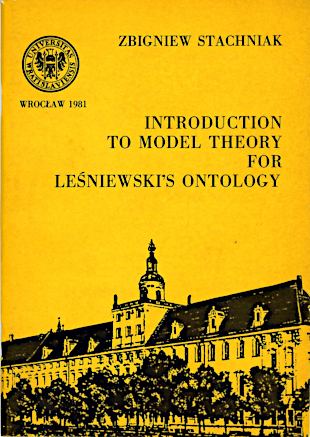 Acta Universitatis Wratislaviensis 586
Acta Universitatis Wratislaviensis 586
Logic 9 (1981)
University of Wrocław

Stanisław Leśniewski (1886-1939) was one of the most influential and prominent Polish logicians of the twentieth century, and a co-founder of the Warsaw School of Logic. He is best known for the creation of a unique system of the foundations of mathematics comprising three deductive theories: Protothetic, Ontology, and Mereology.
The point of departure for the construction of this
system was his study of logical paradoxes, and, in this context, a distinction
between the distributive and the collective interpretation of
a class. This distinction was
reflected in the development of two deductive theories, the theory of
collective classes, which he eventually called Mereology, and the theory of
distributive classes, called Ontology. Finally, in order to
combine Mereology and Ontology into a logically rigorous system,
he constructed Protothetic.
The first version
of Mereology appeared in print in 1916 under the title
Podstawy Ogólnej Teoryi Mnogości. I.(Foundations of a General Theory of Sets. I.)
The construction of Ontology in the period between 1919-1921, marked
the next step in the formation of Leśniewski's system of the foundations
of mathematics, although it was not until 1930 that Ontology appeared in print.
This monograph
presents a formal theory of models for a certain extension of
Leśniewski's Ontology.

Contents
Chapter 1. Ontology L_DF
1.1 Categories
1.2 Basic language L
1.3 Ontological definitions
1.4 The language of ontology L_DF
1.5 The system of ontology L_DF
1.6 Non-creativity of ontological definitions
Chapter 2. Model Theory
2.1 Ontological atomic Boolean systems
2.2 Basic atomic Boolean models
2.3 Generalized atomic Boolean models
2.4 Completeness and compactness
Chapter 3. Omitting types theorem and the fundamental theorem of
ultraproducts
3.1 Omitting types theorem
3.2 The fundamental theorem of ultraproducts
|
 ZBIGNIEW STACHNIAK
ZBIGNIEW STACHNIAK
 ZBIGNIEW STACHNIAK
ZBIGNIEW STACHNIAK